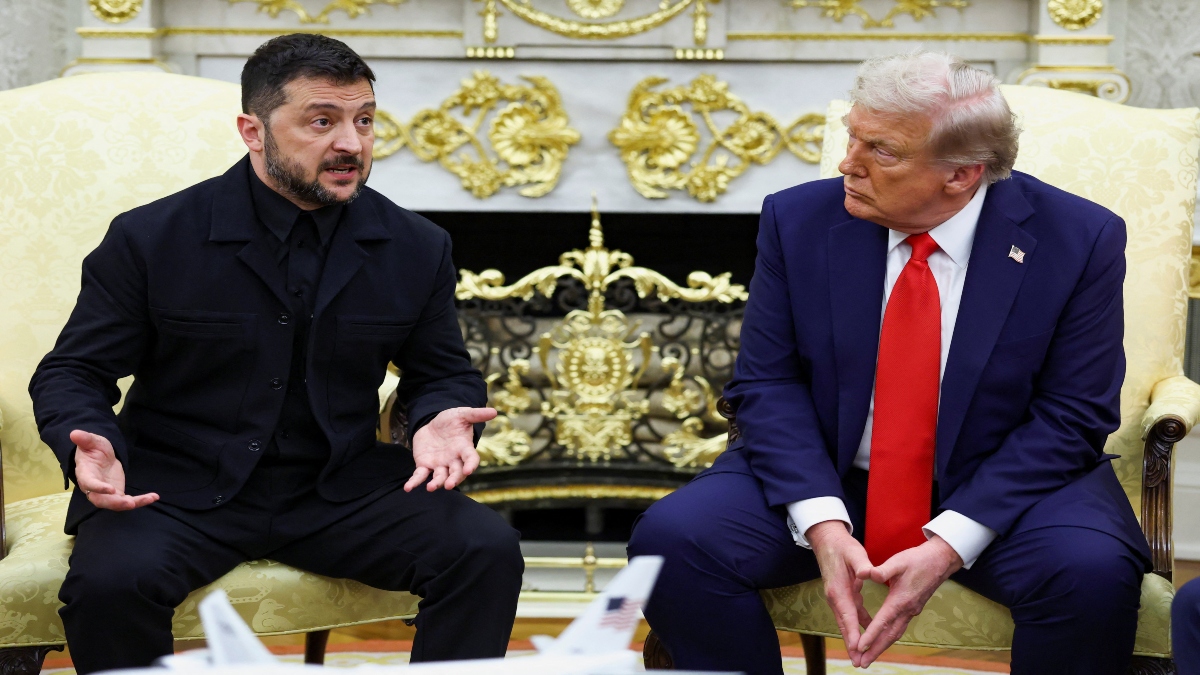US President Donald Trump said on Monday that he may pursue a trilateral meeting with Russian President Vladimir Putin and Ukrainian President Volodymyr Zelenskyy, with the goal of negotiating an end to the ongoing war between Russia and Ukraine.
Speaking alongside Zelenskyy at the White House, Trump indicated that the potential three-way talks would hinge on the outcome of his discussions with the Ukrainian leader.
“We’re going to have a meeting. I think if everything works out well today we’ll have a trilat and I think there will be a reasonable chance of ending the war when we do that,” AFP quoted Trump as saying.
Zelenskyy thanked Trump for hosting the talks, which will be expanded to include European leaders later in the day.
“Thank you for (the) invitation and thank you very much for your efforts, personal efforts to stop killings and stop this war,” he said.
Asked if there will still be “severe consequences” for Russia if a ceasefire isn’t agreed, as he previously said, Trump said that halting the fighting was not a prerequisite for brokering peace.
“I don’t think you need a ceasefire,” The Guardian quoted Trump as saying.
While he acknowledged that a ceasefire would be “good to have,” Trump suggested he understood why either side might resist one, noting the strategic risks it could pose.
“We can work a peace deal while they’re fighting. They have to fight. I wish they could stop, I’d like them to stop, but strategically that could be a disadvantage for one side or the other,” he added.
Impact Shorts
More ShortsTrump left the door open to future American security involvement in Ukraine as part of a potential peace deal with Russia, including the possibility of sending US troops or peacekeepers.
“When it comes to security there’s going to be a lot of help … They’re the first line of defence because they’re there — Europe — but we’re going to help them out also, we’ll be involved.”
Pressed further on whether he would be willing to send US peacekeepers to Ukraine, Trump said the goal would be to work with both Ukraine and Russia to secure a durable peace.
“We’re going to work to ensure a peace that is long-term,” he added.
When asked whether Monday’s talks marked the end of America’s support for Ukraine, Trump rejected the suggestion.
“I can never say that, it’s never the end of the road. People are being killed and we want to stop that,” he said.
Trump said he had spoken to Russian President Vladimir Putin “indirectly” ahead of Monday’s talks with Zelenskyy, and suggested a direct conversation with Putin could follow.
“He’s expecting my call when we’re finished with this meeting,” Trump told reporters, referring to his sit-down with Zelenskyy.
On the sensitive question of redrawing Ukraine’s borders as part of any settlement — effectively ceding territory to Russia — Zelenskyy deflected.
Instead, he emphasised Russia’s ongoing missile attacks ahead of the meeting and said diplomacy must now be the path to stopping the war.
Zelenskyy said he was open to holding an election in safe circumstances if the war with Russia comes to an end.
“We need to work in parliament because during the war you can’t have elections,” adding that it needed to be possible for people to have a democratic, open, legal election.
Elections in Ukraine are currently suspended under martial law.
The high-stakes meeting comes as European leaders — including those from the UK, Germany, France, Italy, Finland, the EU, and NATO — gather in Washington to show unified support for Ukraine and to push for enforceable post-war security guarantees.
Many of them have expressed concern that Trump may push Zelenskyy toward a ceasefire deal aligned with Moscow’s interests, particularly after Trump’s warm reception of Putin during their recent meeting in Alaska.
Zelenskyy has said any potential peace deal must be “lasting” and not repeat past failures, such as Ukraine’s forced concessions in Crimea and eastern Donbas or broken security guarantees.
Meanwhile, Russian strikes on Ukrainian cities continue unabated, with Kyiv describing them as deliberate attempts to undermine the peace process.
With inputs from agencies
)